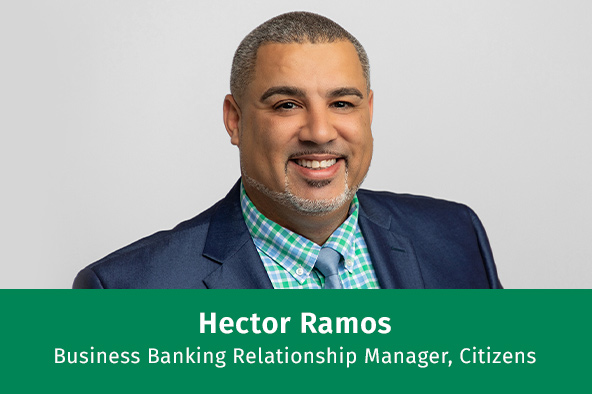Q&A: How to Make the Most of Opportunities as a Hispanic Entrepreneur

Key takeaways
- Keep diversifying. Be open to creating new products and services to keep customers loyal and to generate additional revenue streams for your business.
- Use financial tools. Talk with your business banker to discover what banking tools can help support good cash flow and position your company to seize opportunities.
- Understand your market. Keep a close watch on your customers to track their priorities and monitor your competition so that you can differentiate your product or service to stand out.
Citizens: What are the biggest challenges currently facing businesses? Do they differ for Hispanic-owned businesses?
Ramos: All businesses feel vulnerable right now because we’re operating in unpredictable times. There are so many challenges currently, from supply chain issues and staffing shortages, to having sufficient cash flow and generating enough revenue. It’s more important than ever that we make sure businesses are aware of all the resources available to them, including small business grants and community development programs, as well as banking services that can help their companies run more efficiently and profitably. For example, a program called Manos Accelerator provides mentorship and access to funding sources for Hispanic entrepreneurs in high-tech, and the U.S. Department of Commerce has the Minority Business Development Agency (MBDA) to connect minority businesses with funding sources. Most local markets have initiatives as well; businesses should research nearby support in their community or state. In Massachusetts, for example, there is the Massachusetts Growth Capital Corporation (MGCC), a state-run program that offers resources, training and grants up to $75,000.
Citizens: How did Hispanic-owned businesses fare in the pandemic?
Ramos: Many Hispanic businesses are based on products or services that are typically delivered in person, such as restaurants, personal care like salons and janitorial services. This type of company was heavily impacted during the shutdowns, and if a business owner’s first language wasn’t English it was often difficult for them to find articles and guidance translated into Spanish. Spanish-language resources were scarce, and this created a real disconnect for many Hispanic business owners who did not know what resources were available to them. I think many suffered because of this.

Citizens: What steps did these business owners take to stay in business?
Ramos: Like all companies, Hispanic-owned businesses had to create new ways to serve customers and generate revenue. It was a huge wake-up call about the importance of diversifying company offerings. Restaurants pivoted to offering delivery and takeout. Hair stylists couldn’t seat as many clients inside because of social distancing requirements, so many got creative and offered services in garages or even outdoor in parking lots. Dog groomers created mobile options to take their services to the customer, if the customer couldn’t come to them.
Citizens: What financial challenges do Hispanic businesses face, and what financial tools can help them achieve their goals?
Ramos: A lot of Hispanic owners are first- or second-generation immigrants in the U.S., and a culture of learning financial literacy wasn’t necessarily passed on from generation to generation. So when I sit down with business clients, the first thing I do is talk with them to understand both their unique needs and their level of financial knowledge. Then we set expectations and create an action plan to help them take their business to the next level. This could be anything from merchant services that help them collect payments and get money into their accounts sooner to a line of credit or a business loan to cover expenses and address cash flow issues.
Citizens: Are Hispanic business owners optimistic about the future?
Ramos: Yes, we’re hearing a lot of optimism. Many entrepreneurs feel like the business playing field has leveled off. Nearly every business — some more than others — was forced to reset competitively during the pandemic. Everybody was going through the same situation. Now, they’re optimistic and eager, and see an opportunity to implement new products and services that can leave them better placed if there is another disruption.
Citizens: What unique strengths do successful Hispanic entrepreneurs bring to their businesses?
Ramos: It comes down to resiliency. They have a “never quit” attitude. Entrepreneurs, particularly in the Hispanic community, think positive. They believe in their product or service 110%, and are willing to devote the time and energy necessary to make the most of their investments. Hispanic entrepreneurs are also eager to learn and adapt. They’re proactive about reaching out to friends, professional contacts and trusted advisors like their business banker for advice and insight to help them succeed.
Citizens: What advice do you give to new entrepreneurs?
Ramos: Understand your market. Do your research about what your target customer wants and needs. Look at your competitions’ pricing and promotional efforts and see what you could do better to diversify your offerings to current and new customers. It’s also important to improve your understanding of business financial topics, so I recommend taking advantage of free programs such as the nonprofit small business accelerator and advisory Entrepreneurship For All (EForAll) program. In general, it’s also key to always be thinking ahead. I like to talk with new businesses and ask them where they see themselves in six months and in five years. Then, I can help them create a roadmap and show them what resources are available to take their business to the next level. This gives them a better picture of where they are today — and what they need to get where they want to be in the future.
Resources for Hispanic Entrepreneurs
A number of organizations have programs to support Hispanic-owned businesses:
Latinas Think Big. This online community of more than 20,000 professional women connects Latina entrepreneurs with mentoring, business opportunities and curated content.
Manos Accelerator. This mentorship-driven accelerator program is focused on fast-track Latino/a leaders in high-tech. Programs include an in-person bootcamp in Silicon Valley, an online course for students and early-stage entrepreneurs, and a three-month virtual accelerator with mentorship.
Minority Business Development Agency (MBDA). A subsidiary of the U.S. Department of Commerce, the MBDA offers minority-owned businesses guidance on how to obtain funding and compete globally.
National Minority Support Development Council (NMSDC).Minority Business Enterprise (MBE) certification through the NMSDC helps minority-owned businesses gain access to business, contract, education and networking opportunities.
SCORE for Hispanic Entrepreneurs. Funded in part by the SBA, this nonprofit offers mentorship, education opportunities and other tools to support Hispanic-owned businesses.
Small Business Administration (SBA). Certification through the SBA’s 8(a) business development program helps businesses that are owned and controlled by at least 51% socially and economically disadvantaged individuals compete for federal contracts.
U.S. Hispanic Chamber of Commerce (USHCC). The USHCC is the umbrella organization for more than 250 local Hispanic chambers of commerce and business organizations around the U.S. It develops national programs to help Hispanic businesses and promote trade between Hispanic businesses in the U.S. and Latin America.
Related Topics
Book Publisher Finds Business Success by Supporting Her Community
2022 Small Business Community Champion Award Winners
2022 Business Strategies for Success
© Citizens Financial Group, Inc. All rights reserved. Citizens Bank, N.A. Member FDIC
Disclaimer: The information contained herein is for informational purposes only as a service to the public and is not legal advice or a substitute for legal counsel. You should do your own research and/or contact your own legal or tax advisor for assistance with questions you may have on the information contained herein.
